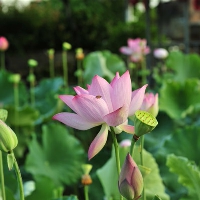经典英语成语故事:如火如荼(中英对照)
like fire and flowering rush
in the years around 480 b.c.china was in the last phase of the spring and autumn period.fu chai,king of the state of wu,conquered the states of yue,lu and chi one after another.then fu chai,overweeningly ambitious,led his army marching into the northwest in an attempt to conquer the state of jin in one vigorous effort.
but just at that time,gou jian,king of the state of yue,outflanked fu chai and attacked him in the rear.gou jian's army fought one battle after another and arrived in gu su,capital of the state of wu,at last,and took away the big boats of the state of wu.gou jin also sent his troops to occupy the huai river immediately,thus cutting off fu chai's retreat
the shocking news reached fu chai,king of the state of wu,like a head-on blow to him.so he called his civilian1 officials and military generals at once to find a way to deal with this serious situation.his civilian officials and military their troops now would mean defeat,and that they would be attacked by both the troops of the jin army and the troops of the yue army.but ,if they could defeat the state of jin,fu chai would become a powerful chief of the princes at that time,and it would not be too late for fu chai to settle with gou jian after that.
having made this decision,they knew that a pressing matter of the moment was to conquer th state of jin as quickly as possible.after considering over and over again,they decided2 to try to defeat the jin army by a surprise move.
one day towards evening,the king of the state of wu gave his orders.the officers and men of the whole army ate their fill,and the steeds were well fed with fodder3.30,000 officers and men were chosen from the whole army to from three phalanxes,with 10,000officers and men each.the solders4 in the middle phalanx wore white suits of armour,and carried white flags and white bows and arrows,and they were led by king of the state of wu fu chai himself.the other two phalanxes were led by senior generals.the soldiers in the left phalanx wore red suits of armour,and carried red flags and red bows and arrows.the in dealing5 with the case,because the empress would certainly blame him and punish him.how could he solve the problem then? he turned the problem over and over in his mind, and finally thought out a "brilliant scheme".
lai junchen had a sumptuous6 feast prepared,and invited zhou xing to his home. the two of them urged each other to drink,and they talked while drinking.after the wine had gone round three times,i often come across prisoners who stubbournly refuse to admit they are guilty.i wonder if you have any effective measures." hearing this,zhou xing said,"get a big vat7,scorch it hot with charcoal8 fire all around,and then let the prisoner come into the vat.will the prisoner fail to make a comfession of his crime?"hearing this,laijunchen nodded his head in approval repeatedly.he then ordered his subordinates to bring a big vat ,and had a charcoal fire lit all around it as zhou xing had said.he then turned to zhou xing and said,"someone in the rebellion.the empress has ordered me to deal with the case severely9.so i beg your pardon,but would you kindly10 step into the soldiers in the right phalanx wore black suits of armour,and carried black flags and black bows and arrows.the whole army set out at midnight,and arrived at dawn at a place within a li's distance of the jin army.when the day was beginning to break,the soldiers of the wu army began to berat the drums heavily and their shoutings resounded11 like rolls of thunder.
awakening12 from their dreams,the solders of the jin army were almost stupefied by the imposing13 manner of the three phalanxes of the wu army.the white phalanx was like a field covered with flowering rush,the red phalanx was like a burning fire,and the black phalanx was simply like a sea too deep to fathom14.
this story comes from comversations from the states.later generations often use the set phrase "like fire and flowering rush"to refer to tremendous momentum15.
春秋时代末期,吴国国王夫差连续征服了越国、鲁国和齐国,雄心勃勃,又继续向西北进军,打算一鼓作气征服晋国。
可正在这个时候,越王勾践抄了吴王的后路。他带领军队一直打到吴国的国都姑苏(苏州),又派人马占据淮河,把吴王的退路切断了。
这消息给吴王夫差当头泼了一盆冷水,他非常震惊,立即召集文臣武将商量对策。大家说,现在退回去等于两关打了败仗,还会两头挨打;如果能打败晋国,就等于在诸候国中当定了霸主,再回去收拾越王勾践也不算晚。
大主意已经拿定,当务之急是尽快征服晋国。考虑再三,决定出奇制胜。
一天傍晚,吴王下达了命令。全军将士吃得饱饱的,马也喂足了草料。从全军中挑出三万精兵强将。每一万人摆成一个方阵,共摆三个方阵。每个方阵横竖都是一百人。每一行排头的都是军官司。每十行,也就是一千人,由一个大夫负责。每项一个方阵由一名将军率领。中间的方阵白盔白甲,白衣服,白旗帜,白弓箭,由吴王自己掌握,称为中军;左边的方阵,红盔红甲、红衣服、红简直就像深不可测;右边的方阵则一水儿黑色。半夜出发,黎明时分到达离晋军仅有一里路的地方。天色刚刚显出亮色,吴军鼓声大作,欢呼之声震天动工地。
晋军从梦中醒来,一看吴军那三个方阵和声威气势,简直都惊呆了:那白色方阵,“望之如荼”——像开满白花的茅草地;那红色方阵,“望之如火”——如像熊熊燃烧的火焰;而那黑色的方阵,简直就象深不可测的大海。
故事出自《国语·吴语》。成语“如火如荼”,形容某种人群或事物阵容之大,气势之盛。
 雪中无处寻 2024-04-21 10:59:39
雪中无处寻 2024-04-21 10:59:39









